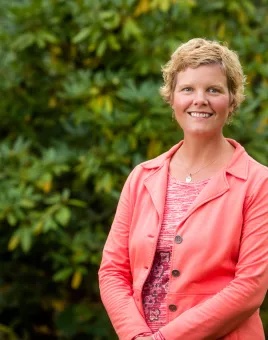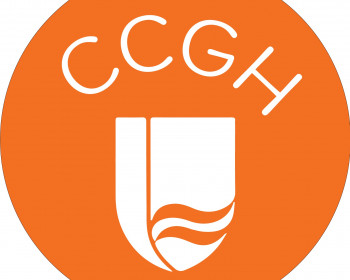From the Inside-Out: 5 Questions for Molly Robinson
In Summer 2022, Molly Robinson, associate professor of French, completed Inside-Out Prison Exchange Program’s Instructor Training thanks to a faculty grant from the Mellon Foundation and the Center for Community and Global Health.

In Summer 2022, Molly completed Inside-Out Prison Exchange Program’s Instructor Training thanks to a faculty grant from the Mellon Foundation and the Center for Community and Global Health.
As the Director of the Teaching Excellence Program, Molly has a lot of expertise in pedagogy and teaching training. For her, the Inside-Out experience was unique and transformative.
“Be ready to go deep,” she says. “Be ready to break down the barriers between what you see as academic and intellectual and valid and what you see as personal, emotional, perhaps psychological. Be ready to learn a more holistic and more inclusive way of seeing what you are doing as a teacher.”
Here, Molly answers five questions about her experience at Inside-Out Training.
Did this training differ from other training you have participated in? If so, how?
It’s hard to compare it to anything else. The online training was very intense. It was six full days in a row and very immersive. While it was sort of grueling to be online all that time, it created a real sense of community and bonding that probably would happen naturally in person. Usually when you are online you can be doing multiple things at once, but you couldn’t do that with this.
You had to be very present.
Inside-Out training was designed to create a sense of bonding and community and belonging through conversation topics and what they call icebreakers. The whole training was very meta pedagogical. They were using techniques that they were trying to teach us to use in our classes.
This training was designed to push individuals to go deep within themselves to find things that have impacted and influenced them and brought them to where they are today, and to share those experiences with these people who are initially strangers, who then become just for that one week, a group of people you can really appreciate.
Who leads the training?
Training was facilitated by Lori Pompa, the founder and executive director of the Inside-Out Prison Exchange at Temple University as well as Jeri Kirby, an associate professor of criminal justice at Fairmont State University in West Virginia, who is one of five co-facilitators for Inside-Out Training.
The third aspect of the training that was really unique was the participation of coaches. Coaches are formerly incarcerated students who are now out. It may be that all of them had been a part of the program when they were inside. To me they were absolutely the most impactful part of the experience.
The coaches who had been incarcerated were so open and articulate about their experiences. We had a big group project that we had to create and the coaches were part of our group. In those conversations they told a lot about their stories. It kind of blew me away because I had never really had contact with people who had been incarcerated. My two coaches had been in for 25 years. It was just something that I’ve never experienced before.
The training allows you, forces you, to see the incarcerated students and formerly incarcerated coaches as human beings who have a story, who have troubles, and joy, and pain. You can’t dismiss anyone as just someone who was in prison. We can’t dismiss their humanity and human experiences. When you hear everyone’s stories you are reminded that they are intelligent, good, ethical people. You can’t disregard what is happening in our prison system. I think that Inside Out humanizes those that we in society tend to dehumanize. By extension, it forces you to question, what if you were always defined by the worst thing you did in your life?
You mentioned that the training pushes individuals to go deep within themselves, in what ways?
The training leans heavily into storytelling. They almost require that people share their own personal stories. In our group, it actually brought up conflict and tension around race and privilege and sharing of stories that for some felt too personal and too vulnerable. Lori was super receptive to that and the way that played out was really interesting, too.
I think so much of what we do in academia is really geared towards the intellectual and the mind. And in many cases people in academia might shy away from conversation topics that are focused on their personal experiences, sometimes painful experiences, informative experiences of their lives and how that’s impacting them right now.
What skills were you able to develop through the training? And can you see yourself incorporating those into different aspects of life or into your teaching outside of the Inside-Out Program?
The skills that we were learning at the training were definitely skills of inclusive pedagogy. It was like inclusive pedagogy on steroids. When you’re teaching a group that is at the onset so diverse–in terms of students who are incarcerated and students who are outside and free to do what they want. When you have that level of divergence in daily experience in the group, it’s a real challenge to go in and make sure that everyone feels included, feels they belong and that they’re part of the group.
These are skills that everyone should know and that everyone should be using. It’s something that focuses on all students in class seeing themselves as a community, seeing themselves as a group that belongs to each other, and with each other. The idea is that learning can best happen when everyone in the group feels like they belong to the group.
This training gave me even more ideas. I am going to be leaning more into storytelling and ice breakers. Inside Out’s emphasis on storytelling, community, inclusivity, and leveling the playing field for students who are coming from extremely different experiences and backgrounds, is so impactful.
Do you plan to teach an Inside-Out class at Lewis and Clark? If so, what is it called and when can students expect to see it?
I definitely plan to teach a course in Fall 2023. The provisional title is The Cry of Freedom and it’s going to be a comparative literature or world literature class. We’ll be reading texts from different time periods and different countries and areas of the world, all of which relate in some way to the yearning for freedom and the limitations that are sometimes placed on our freedoms.
We’ll be exploring the idea of how the yearning for freedom has expressed itself in literature, in different times, in different places, in human history.
ABOUT THIS PROGRAM
With support from Mellon Foundation, the Center for Community and Global Health is expanding the Inside-Out courses offered by Lewis & Clark College. Inside-Out brings fifteen people incarcerated at the Columbia River Correctional Institution and fifteen undergraduate students together in courses taught by Lewis & Clark faculty.
Find out more about Inside-Out Instructor Training Faculty Grant applications.
More Center for Community and Global Health Stories
Community and Global Health is located in room 307 and 309 of JR Howard Hall on the Undergraduate Campus.
MSC: 25
email communityglobalHEAL@lclark.edu
voice 503-768-7636
Jerusha Detweiler-Bedell
Director
jerusha@lclark.edu
Carolyn L. Zook
Associate Director and Pre-Health Advisor
carolynzook@lclark.edu
Alexis Rehrmann
Community Engagement Coordinator
alexisr@lclark.edu
Community and Global Health
Lewis & Clark
615 S. Palatine Hill Road MSC 25
Portland OR 97219

